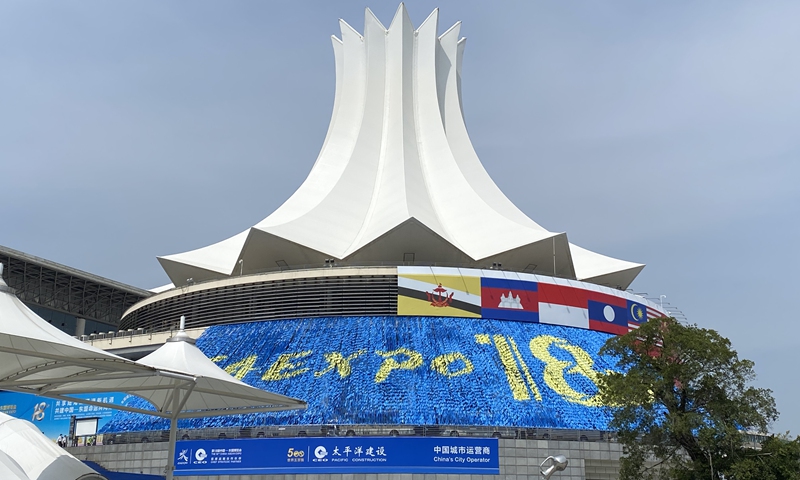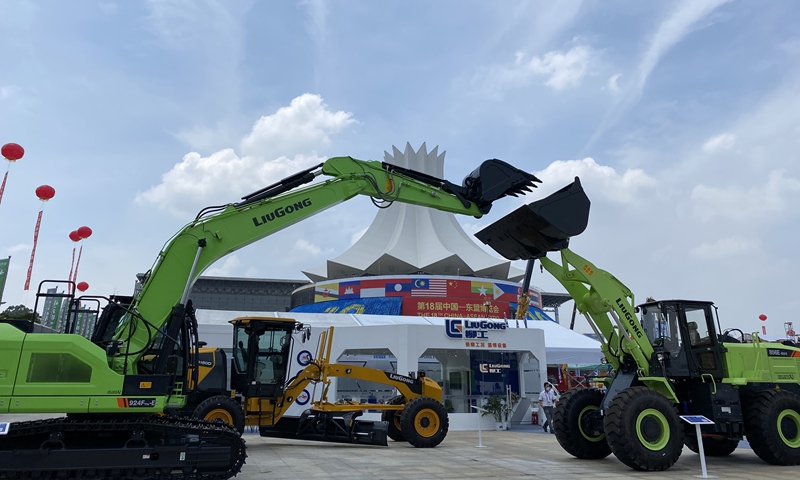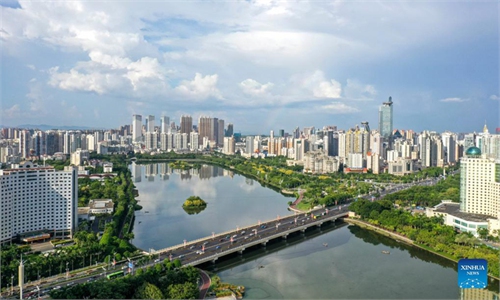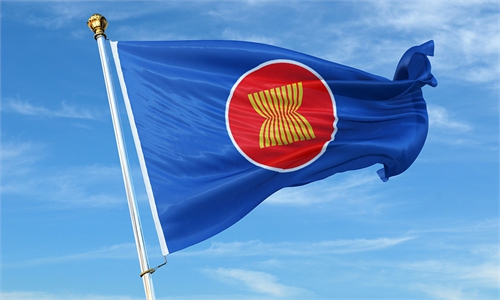China and ASEAN expected to expand cooperation in vaccine, digital economy and investment, despite US’ efforts to split the region
Cooperation to expand in vaccine, digital economy and investment

Merchants from countries including ASEAN members and those along the Belt and Road Initiative sold local products at the 18th China-ASEAN Expo held in Nanning, South China's Guangxi Zhuang Autonomous Region on Friday. Photo:Zhang Dan/GT
Amid the 30th anniversary of China-ASEAN dialogue relations, the 18th China-ASEAN Expo and China-ASEAN Business and Investment Summit kicked off on Friday to further explore cooperation in digital economy, epidemic and investment and trade, and Chinese analysts said the deepened bilateral relations which was the most successful in Asia-Pacific region will see the two become the first to rebound in people-to-people exchange in the world with mutual vaccine recognition and experience the fastest post-pandemic economic recovery.
The Expo and Summit were held three weeks after US officials' visit to Southeast Asia, which tried to force regional countries to pick a side between China and the US, and analysts said that the unprecedented China-ASEAN relations showed that ASEAN will not allow the US to shatter the unity of the region, and the US' Indo-Pacific strategy is doomed to fail.
Chinese President Xi Jinping sent a congratulatory letter to the summit, which kicked off Friday in Nanning, South China's Guangxi Zhuang Autonomous Region. This year marks the 30th anniversary of China-ASEAN dialogue relations, which also marks the historic high-level of multilateral relations.
Xi said China and the Association of Southeast Asian Nations (ASEAN) have become each other's largest trading partners with the most dynamic cooperation in the Asia-Pacific region.
The two sides have been working jointly to fight the COVID-19 pandemic, demonstrating the spirit of helping each other and sharing weal and woe for a community with a shared future, the president said.
Addressing the opening ceremony of the Expo, Chinese Vice President Wang Qishan said that ASEAN is a priority in China's neighborhood diplomacy, and China will import more high-quality products from ASEAN, expand mutual investment, deepen the industrial supply chain cooperation.
"Over the past 30 years, the two sides jointly promoted peace and stability in the region and promoted development and prosperity, setting a good example of cooperation in the Asia-Pacific region," Wang said.
China is ready to strengthen cooperation with ASEAN in electronic commerce, big data and artificial intelligence, Wang said.
China is ready to work with ASEAN to advance the Belt and Road Initiative (BRI) with high quality, connect the development strategies of ASEAN and deliver more results of practical cooperation, Wang said.

Photo:Zhang Dan/GT
Trade between China and ASEAN increased from $8.36 billion in 1991 to $685.28 billion in 2020, according to customs statistics. And China has been ASEAN's largest trading partner for 12 years in a row.
The Dialogue between the Communist Party of China (CPC) and Political Parties from Southeast and South Asian countries was also held in Nanning on Thursday, with more than 40 party leaders and 300 representatives from governments participated online.
Song Tao, minister of the International Department of the CPC Central Committee, said on Thursday that the CPC is ready to conduct consultations among political parties under the Belt and Road Initiative to boost practical cooperation in economic development, poverty alleviation, epidemic prevention and control, and youth exchanges, so as to inject new impetus into regional development.
The expo and the summit opened the door for future broader, more deepened and creative cooperation when China-ASEAN relations reached to an unprecedented high level, Yang Xiyu, a former Chinese diplomat and senior research fellow at the China Institute of International Studies, told the Global Times on Friday.
"In the past 30 years, China-ASEAN relations experienced a qualitative leap in both depth and breadth with cooperation expanded from non-sensitive fields to sensitive fields such as cooperation on the South China Sea. Since the pandemic, the two sides explored new cooperation areas in the public health sector, such as advancing the building of a 10+3 medical supplies reserve center," Yang said.
According to the preliminary calculation of the China Chamber of Commerce for Import and Export of Medicines and Health Products, in 2020, the trade of China's medical products to ASEAN was worth $18 billion, up 72 percent, among which the export was $13.2 billion, up 92 percent, and imports at $4.8 billion, up 33 percent.
"China-ASEAN relations, the most successful relations in Asia-Pacific region, have created an example for international relations between nations with different social systems, at different development stages and with differences," Yang said.
The two sides will experience the fastest post-pandemic economic recovery in the world when the global pandemic and variants are controlled, which will further boost the bilateral relations, Yang said, noting that most ASEAN members used Chinese COVID-19 vaccines which will provide much convenience in mutual vaccine recognition, making the region the first to rebound in people-to-people exchanges after the pandemic.
New cooperation areas
Malaysia's ambassador to China Nushirwan Zainal Abidin told the Global Times on Friday at the expo that assistance provided by the two countries to fight the coronavirus was reciprocated. And he hoped for mutual vaccine recognition.
"When China was struck by the pandemic, Malaysia donated a large number of medical rubber gloves, with about 67 percent of the world production of that particular commodity being produced by us. When the pandemic hit Malaysia, this assistance was reciprocated," he said.
Many Chinese entities donated medical equipment and facial masks to Malaysia. China also donated COVID-19 vaccines which "now constitute a significant proportion of the portfolio of vaccines used by Malaysia," he said.
Asked whether the Malaysian ambassador took shots of Chinese vaccine, he told the Global Times: "Sinovac - two doses. I can show you the certificate."
With China being the main source of vaccines, Cambodia has made its capital city Phnom Penh the most vaccinated capital in the world with around 99 percent of adults fully vaccinated, according to Mekong Strategic Partners, an advisory firm in Cambodia.
Cambodian Prime Minister Samdech Techo Hun Sen on Friday expressed profound gratitude to the Chinese government and Chinese people for the donation of COVID-19 vaccine and supplying medical equipment to Cambodia during a virtual speech at the opening ceremony of the expo.
"I highly appreciated the experiences of patients shared by the Chinese government and its people as well as China's vaccine supplies. They actively participate in the global fight against the coronavirus while playing a leading role," he said.
Other cooperation could be made in the digital field, such as the digitalization of infrastructure, where China and ASEAN were already in cooperation for years, analysts said.
"Cloud, network and terminal interconnection may be the beginning of digital cooperation, including the construction of base stations. China can also export business application scenarios and models such as e-commerce, logistics and fintech to ASEAN, given China's rich experience in these areas," Wang Peng, an assistant professor at the Gaoling School of Artificial Intelligence at the Renmin University of China, told the Global Times on Friday.
Digital cooperation has started. For instance, Lu Dongliang, Chairman of China-ASEAN Information Harbor Co. (CAIH), said on Friday that the company has set up subsidiaries in Indonesia and Malaysia, and has conducted over 20 projects in the digital economy field in the Laos.
"We have established the first cloud computing center for commercial use in Laos," Lu added.
Bounsaluemsay Khennavong, Vice Minister of Technology and Communications of Laos, said on Friday that the country will strengthen cooperation with China in the digital field, such as e-government and cybersecurity.
"We hope to continue to learn valuable experiences from China and carry out more cooperation projects to achieve our goals," the vice minister said.
Looking further, trade in services would also be a future cooperation direction.
"Today, if you look at the economic interactions between China and Singapore, for the last 8 years, China has been Singapore's largest trading partner. And over the same period, Singapore was China's largest foreign investor. But if you look deeper into it, China is in the lead on trading goods, but it's only one of our top five trading partners in services," Lui Tuck Yew, Singapore ambassador to China, told the Global Times on Friday at the expo.
As a result, Lui stressed that there is great potential for Singapore and China to put more efforts into the area of services, including investments, services liberalization, non-tariff barriers, digital economy, green economy and green financing.
US Indo-Pacific card to fail
Also on Friday, Chinese State Councilor and Foreign Minister Wang Yi started an official visit to Vietnam, Cambodia, Singapore and South Korea to boost ties, shortly after US Vice President Kamala Harris' visit to the Southeast Asian countries.
Unlike the US, with its self-centered and hegemonic Indo-Pacific policy, which tried to force the region to pick a side between China and the US, China has been developing friendly and peaceful ties with the region which conforms to the interests of regional countries, experts said.
For the US, maintaining and strengthening its leadership in the region is its sole purpose, and regional countries' economies and people's livelihood have never been on its list, experts said.
They said that ASEAN members understand the US' real role in the international arena which is splitting regions, just like what it did to Afghanistan and its neighboring countries, and they will not allow it to shatter the unity of the region, experts said.




